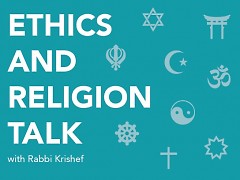This is our third and final column of responses to the question submitted by Elisabeth G-P:
“All of the major religions say ‘Do unto others as you would have them do unto you.’ Jesus said to ‘Love one another and that, of faith, hope and charity, love is the greatest of these.’ So why do they also say that their religion is the ‘one, true religion,’ when they all share the same premise?”
Previous columns presented the pluralism of non-Christian faiths and Christian denominations who believe that Christianity is the ‘one, true, religion’ and differ on their interpretation of the requirement to treat all people with love. This week, we turn to two more Christian responses.
Ty Silzer, a former pastor in the Presbyterian Church in America, responds:
“Great question. First, Paul (not Jesus) said ‘…faith, hope… Love is the greatest of these’ (1 Corinthians 13), but Jesus did say ‘Love one another’ (John 13) (as a ‘new’ commandment, no less) and the Golden Rule (Matthew 7:12, Luke 6:31).
“Christianity never claims to be the one, true religion. If we are guilty of that statement (we are), it’s not from our scriptures, it’s from our members. But this is similar to the rivalry that one sports teams’ fans have towards all other teams. ‘We’re in; we’re right; we’re the best; the rest of you all are out/wrong/clueless.’ This isn’t Divine. This is tribal. This is human. And while I would argue it isn’t right, it happens, because we’re humans.
“In a recent submission for the column, I refer to both Jesus and the Roman Centurion—a man whose (successful) career depended on worshipping the Emperor. Did Jesus have a ‘come to Me’ moment with him? No. He praised what He saw in the man that pointed to the Truly Divine. Likewise, Paul uses a backdoor at Mars Hill in Athens to squeak all of the debating philosophers into the Kingdom: they’ve been unknowingly worshipping the One True God, all along. I say this to point out when Christianity plays up its exclusivity, it’s not considering the breadth of its scriptures, in which its historic figures, heroes and founders are trying to include as many as possible, as God loves the entire world.”
R. Scot Miller, who writes from an Anabaptist and Quaker Christian perspective, responds:
“To begin with, no religion or the adherents of any religion should claim the title of ‘one true religion.’ This is a propositional truth claim that fails to meet the criteria of logic. The statement is also an indicator of a few primary assumptions that many of us make by default. These assumptions are in fact one of the biggest impediments to individuals or religious communities acting in faith.
“The first assumption is that we should work to legislate or enforce behaviors that some believe to be self-evident moral truths, such as pre-marital sex or theories of self-defense. Morality is in fact based upon cultural factors that lead to interpretations of behaviors, data, and texts that tend to work in favor of those at the top of social hierarchies. Such elites rarely hold themselves accountable to such imperatives as ‘thou shalt not kill’ by favoring laws that support ‘standing one’s ground.’
“Because they have the resources to navigate moral dilemmas in a manner that produces favorable outcomes, privileged populations can legislate laws about taking the life of others according to religiously assumed moral truths, and then manipulated those truths to suggest that one should not kill unless they feel threatened, even when the other person is unarmed. Such manipulation strips the religious assumptions of moral behaviors bare, indicating that religion does not in fact serve as an indicator of truthfulness that will justified by faith, but rather a general premise that must be interpreted according to the outcomes produced, based on beliefs rather than faith that is necessary to religious claims. If one is a member of the one true religion, they must make the statement credible by acting according to faith rather than manipulating moral strictures toward the best possible outcomes any one person or group.
“Secondly, to stress that any institution represents any truth claim in totality fails in response to the ancient story of God confusing the languages at the Tower of Babel. Once a religious or political, or ethnic collection of people lay claim to representation of total truth, they lose the ability to recognize any truth because the institution can no longer be self-aware enough to hold itself accountable for heresies or fallacious logic. Once a universal truth claim is made, it excludes intellectual or emotional growth and stunts change. It avoids the reality of diversity by trying to bury it or suppress it. Once diversity or argumentation is suppressed, there can no longer be truth to identify. The future becomes impossible.”
This column answers questions of Ethics and Religion by submitting them to a multi-faith panel of spiritual leaders in the Grand Rapids area. We’d love to hear about the ordinary ethical questions that come up on the course of your day as well as any questions of religion that you’ve wondered about. Tell us how you resolved an ethical dilemma and see how members of the Ethics and Religion Talk panel would have handled the same situation. Please send your questions to [email protected].
The Rapidian, a program of the 501(c)3 nonprofit Community Media Center, relies on the community’s support to help cover the cost of training reporters and publishing content.
We need your help.
If each of our readers and content creators who values this community platform help support its creation and maintenance, The Rapidian can continue to educate and facilitate a conversation around issues for years to come.
Please support The Rapidian and make a contribution today.
